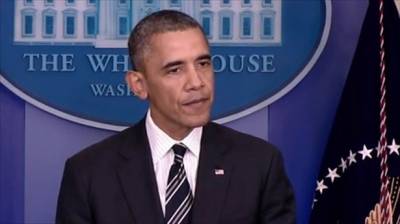Without a budget in place, the US government has run out of the cash
needed to pay thousands of government workers in Washington and keep
national parks open. But this week an even more critical issue comes to
the fore. On Thursday, the country will be forced to default on its
$16.8 trillion in borrowings if it does not secure a rise in the debt
ceiling. 
Republican
leaders, aware that their intransigence over the budget has hit the
party’s popularity, last week proposed a six-week postponement of the
deadline. John Boehner, leader of the Republicans in the House of
Representatives, has dropped a previous demand that talks could only
take place following a Democrat concession to review President Barack
Obama’s Affordable Care Act – or "Obamacare” – although a format for
discussions has yet to be agreed.
How did we get here?
The road towards a default that would risk plunging the world economy
into recession began last year in the wake of Obama’s return to the
White House. The radical Tea Party wing of the Republicans decided that
the only way to block Obamacare, which for them exemplifies hated "big
government”, was to hold up the president’s entire budget plan.
Why has Washington suffered a shutdown?
A six-month fight over the budget between the two houses of
government – the Republican lower house and the Democrat-controlled
Senate – has meant no formal funding has been agreed and left government
departments struggling to pay their bills. For the first time in 17
years, parts of government spending have been shut down. Some 800,000
government workers were initially sent home – equivalent to the combined
workforces of Exxon Mobil, General Motors, Google and giant US retailer
Target.
Even the Pentagon sent home 350,000 staff in that initial wave,
though it later called them back when funds were made available.
National parks remain closed and applications for most permits and
licences are being badly delayed. Schools are open and hospitals are
unaffected, though health research has been disrupted.
What is the debt ceiling?
This is the government borrowing limit set by Congress. The
government actually bumped up against the $16.7 trillion limit five
months ago as the budget dispute got under way. Ever since, the treasury
department has taken a series of "extraordinary measures” to raise an
extra $303 billion. But that money will not last much longer.
Why is October 17 significant?
US treasury secretary Jack Lew has warned that this is when the
treasury will exhaust those extraordinary measures. Without the means to
pay both multibillion-dollar interest payments and social security
bills, it will default.
What are the implications?
Nobody knows what a default would mean in practice. Investors around
the world have lent the US money by buying its treasury bonds. In
theory, a failure to pay a single interest payment on a tranche of debt
will trigger a demand from all bondholders for their money back. In
practice this is unlikely.
What will happen to the US economy?
American businesses with public-sector contracts will suffer a delay
in payments and could go bust – unemployment has already risen as a
result of the shutdown. More broadly, the US economy has been the main
driver of global growth. Should the government be forced to default, it
could trigger an estimated 4.5% fall in GDP and the rest of the world
would fall back into recession.
The extent of nerves in the markets was shown when the news of a
possible six-week extension of the borrowing limit sent the Dow Jones
index of leading shares soaring by more than 300 points.
What about the UK?
Britain would be hit hard by a US recession. Many of our exports go
to America, especially manufactured goods. Without growth in the US, the
UK could see its still-fragile recovery snuffed out. Already, BAE
Systems, Britain’s biggest manufacturing employer, is warning of
problems ahead should the two-week-old shutdown become a crisis. BAE has
half its business in the US and has already frozen the wages of 1,200
staff in Washington. Fellow arms firm Chemring saw its shares plummet on
Friday after it warned the shutdown would affect its profits.
Meanwhile, outsourcing firms G4S and Serco have US staff unable to work.
And the rest of the world?
The Chinese are panicked. China’s Xinhua news agency labelled US
domestic politicians "dangerously irresponsible” for wrangling over
debt. In an editorial, the state-run media organisation said the rest of
the world had been "kidnapped” by American politics, which was involved
in "a game of chicken”. The Germans are also anxious. Anton Böner,
president of the Federal Association for German Wholesalers and Foreign
Trade, warned: "If the Americans shoot themselves in the foot right now,
it is highly dangerous for the entire global economy, and of course for
the German export economy.”
Why are the Republicans proposing a six-week delay to the debt ceiling?
An opinion poll by NBC News and the Wall Street Journal last
week gave the Republican party the lowest standing in the history of
the poll. It showed that more than twice as many Americans had a
negative view of it than a positive one. While 31% held Obama
responsible for the shutdown, 53% blamed Republicans. Boehner said he
wanted six weeks to debate all aspects of the budget, but White House
sources said they were convinced his aim was still to scupper Obamacare.
guardian.co.uk © Guardian News and Media 2013 Phillip Inman, The Observer
|  Main
Main 
 Registration
Registration Login
Login